Before you Buy: Check the Credit Tab to Make Sure Your Jurisdiction is Accredited!
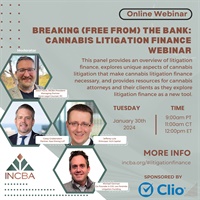
- Average Rating:
- 6
- Categories:
- Cannabis Banking and Finance
- Faculty:
- Jason Horst | Casey Grabenstein | Jeffery Lula | Michael German
- Duration:
- 1 Hour 5 Minutes
- Format:
- Audio and Video
- SKU:
- INCBA013024financeOD
- License:
- Short Description:
- This panel provides an overview of litigation finance, explores unique aspects of cannabis litigation that make cannabis litigation finance necessary, and provides resources for cannabis attorneys and their clients as they explore litigation finance as a new tool.
- Price:
- $30.00 - $75.00
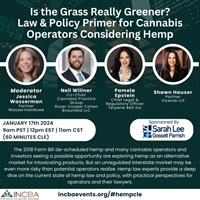
- Average Rating:
- 7
- Categories:
- Hemp | Hemp Law
- Faculty:
- Jessica Wasserman, JD | Neil Willner | Pamela Nicole Epstein | Shawn Hauser
- Duration:
- 1 Hour 30 Minutes
- Format:
- Audio and Video
- SKU:
- INCBA011724hemplawOD
- License:
- Short Description:
- The 2018 Farm Bill de-scheduled hemp and many cannabis operators and investors fatigued by over-regulation are exploring hemp as an alternative market for intoxicating products. But an unregulated interstate market may be even more risky than potential operators realize. Hemp law experts provide a deep dive on the current state of hemp law and policy, with practical perspectives for operators and their lawyers.
- Price:
- $30.00 - $75.00
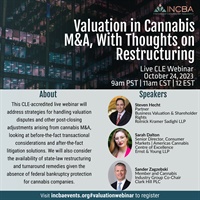
- Average Rating:
- 12
- Categories:
- Mergers & Acquisitions | Corporate Governance | Finance | Risk Management
- Faculty:
- Steven Hecht | Sarah Dalton | Sander Zagzebski
- Duration:
- 1 Hour 7 Minutes
- Format:
- Audio and Video
- SKU:
- INCBA102423valuOD
- License:
- Short Description:
- This panel will address strategies for handling valuation disputes and other post-closing adjustments arising from cannabis M&A, looking at before-the-fact transactional considerations and after-the-fact litigation solutions. We will also consider the availability of state-law restructuring and turnaround remedies given the absence of federal bankruptcy protection for cannabis companies; it’s a hybrid event.
- Price:
- $30.00 - $75.00
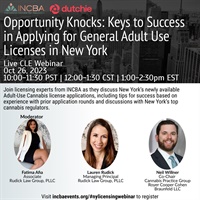
- Average Rating:
- 4
- Categories:
- Licensing | Licensing and Permitting | Regulation law
- Faculty:
- Fatima Afia | Lauren Rudick | Neil Willner
- Duration:
- 1 Hour 29 Minutes
- Format:
- Audio and Video
- SKU:
- INCBA102623nykeysOD
- License:
- Short Description:
- Join licensing experts from Dutchie and INCBA as they discuss New York’s newly available Adult-Use Cannabis license applications, including tips for success based on experience with prior application rounds and discussions with New York’s top cannabis regulators. This program is accredited for 1 hour of CLE.
- Price:
- $30.00 - $75.00

- Average Rating:
- 2
- Bundle:
- Global Cannabis IP Symposium 2023 On-Demand Bundle
- Categories:
- Copyrights and Trademarks | Intellectual Property | IP law
- Faculty:
- Mary Shapiro, JD, MBA | Natalie Rizkalla-Kamel | Katie Paterno, JD | Thomas Verborgh | Arturo Revilla
- Duration:
- 1 Hour 19 Minutes
- Format:
- Audio and Video
- SKU:
- INCBA092923brandsOD
- License:
- Short Description:
- INCBA Global Cannabis Intellectual Property Symposium 2023 session: Global Protection of Cannabis Brands - Is it Possible?
- Price:
- $30.00 - $75.00

- Average Rating:
- 2
- Bundle:
- Global Cannabis IP Symposium 2023 On-Demand Bundle
- Categories:
- Intellectual Property | IP law | Patents & Trade Secrets
- Faculty:
- Sheila Gibson | Anthony Parker | Poonam Tauh | Gretchen L. Temeles
- Duration:
- 1 Hour 23 Minutes
- Format:
- Audio and Video
- SKU:
- INCBA092923patentsOD
- License:
- Short Description:
- INCBA Global Cannabis Intellectual Property Symposium 2023 session: Cannabis Patents and Plant Variety Rights - Things to Know and Challenges Unique to the Cannabis Industry
- Price:
- $30.00 - $75.00
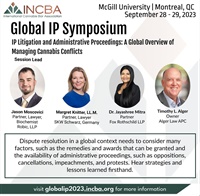
- Average Rating:
- 2
- Bundle:
- Global Cannabis IP Symposium 2023 On-Demand Bundle
- Categories:
- Intellectual Property | IP law | Administrative Law | Alternative Dispute Resolution | Litigation
- Faculty:
- Jason Moscovici | Dr. Jayashree Mitra | Timothy L. Alger | Margret Knitter, LL.M.
- Duration:
- 1 Hour 7 Minutes
- Format:
- Audio and Video
- SKU:
- INCBA092923iplitigOD
- License:
- Short Description:
- Global Cannabis Intellectual Property Symposium 2023 session: IP Litigation and Administrative Proceedings: A Global Overview of Managing Cannabis Conflicts
- Price:
- $30.00 - $75.00

- Average Rating:
- 2
- Bundle:
- Global Cannabis IP Symposium 2023 On-Demand Bundle
- Categories:
- Intellectual Property | IP law | Administrative Law | Ethics | Specialty Credits
- Faculty:
- Hannah Stitt | Rachael Dickson | Arturo Revilla | Jeffrey Merk
- Duration:
- 1 Hour 2 Minutes
- Format:
- Audio and Video
- SKU:
- INCBA092923ethicsOD
- License:
- Short Description:
- Global Cannabis Intellectual Property Symposium 2023 session: Ethics: Balancing Activism and Zealous Advocacy with the Boundaries of the Profession and Evolving Law
- Price:
- $30.00 - $75.00

- Average Rating:
- 2
- Bundle:
- Global Cannabis IP Symposium 2023 On-Demand Bundle
- Categories:
- Copyrights and Trademarks | International Drug Policy | International Law
- Faculty:
- Luke Zimmerman, Esq., LL.M | Joseph A. Bondy | Dr. Giovanna Toti | Bryan Khan | Enrico Bonadio
- Duration:
- 1 Hour 19 Minutes
- Format:
- Audio and Video
- SKU:
- INCBA092823treatOD
- License:
- Short Description:
- International Treaties: Budding Opportunities with Cannabis Intellectual Property
- Price:
- $30.00 - $75.00

- Average Rating:
- 2
- Bundle:
- Global Cannabis IP Symposium 2023 On-Demand Bundle
- Categories:
- Copyrights and Trademarks | Intellectual Property | IP law | Risk Management
- Faculty:
- Amanda Conley | Marcelo Pomeranz | Laura Schniedwind | Pearl Chan | Soody Tronson
- Duration:
- 1 Hour 19 Minutes
- Format:
- Audio and Video
- SKU:
- INCBA092823toolOD
- License:
- Short Description:
- Expand Your Toolbox: Creative Approaches to IP Licensing, Protection, and Exclusivity
- Price:
- $30.00 - $75.00
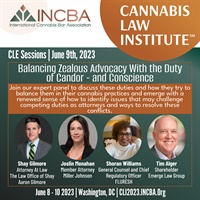
- Average Rating:
- Not yet rated
- Bundle:
- CLI2023 On-Demand
- Categories:
- Ethics | Mindfullness | Specialty Credits
- Faculty:
- Joslin E. Monahan | Shoran Williams | Timothy L. Alger | Shay Gilmore
- Duration:
- 1 Hour 9 Minutes
- Format:
- Audio and Video
- SKU:
- INCBA072023candorOD
- License:
- Short Description:
- As the cannabis industry grows and more states allow cannabis licensing, the ethical duties that cannabis attorneys must balance have grown more complicated. These ethical duties require lawyers to balance and re-evaluate their duty to zealously advocate for their clients with the duty of candor, their duties to all of their cannabis clients – and, at times, their belief systems and why they entered cannabis law originally. Join our expert panel to discuss these duties and how they try to balance them in their cannabis practices and emerge with a renewed sense of how to identify issues that may challenge competing duties as attorneys and ways to resolve these conflicts.
- Price:
- $30.00 - $75.00
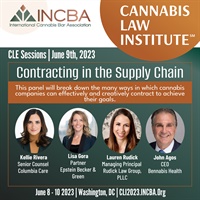
- Average Rating:
- 1
- Bundle:
- CLI2023 On-Demand | CLI2023 Overcoming Operational Hurdles Bundle
- Categories:
- Operations | Business
- Faculty:
- John Agos | Lisa Gora, Esq. | Kellie Rivera, Esq, | Lauren Rudick
- Duration:
- 1 Hour 3 Minutes
- Format:
- Audio and Video
- SKU:
- INCBA072023supplyOD
- License:
- Short Description:
- Effective strategies for success depend on contracts. Given the complexity of the legal and regulatory landscape around cannabis, operators and ancillary providers must be creative and unique to achieve maximum results within the bounds of what is permissible. This panel will break down the many ways in which cannabis companies can effectively and creatively contract to achieve their goals.
- Price:
- $30.00 - $75.00
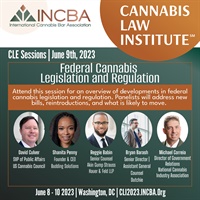
- Average Rating:
- 2
- Bundle:
- CLI2023 Federal Policy Bundle | CLI2023 On-Demand
- Categories:
- Federal Law | Regulation law | Regulations | Regulatory
- Faculty:
- Reggie Babin | Shanita Penny | David Culver | Bryan Barash
- Duration:
- 56 Minutes
- Format:
- Audio and Video
- SKU:
- INCBA072023fedcannOD
- License:
- Short Description:
- Federal Cannabis Legislation and Regulation. Attend this session for an overview of developments in federal cannabis legislation and regulation. Panelists will address new bills, reintroductions, and what is likely to move.
- Price:
- $30.00 - $75.00
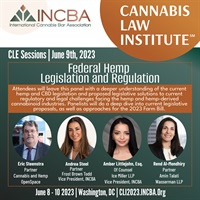
- Average Rating:
- 2
- Bundle:
- CLI2023 On-Demand | CLI2023 Federal Policy Bundle
- Categories:
- Federal Law | Federal Policy | Hemp | Hemp Law | Regulation law | Regulations | Regulatory
- Faculty:
- Rend Al-Mondhiry | Amber Littlejohn, Esq. | Andrea Steel | Eric Steenstra
- Duration:
- 1 Hour 5 Minutes
- Format:
- Audio and Video
- SKU:
- INCBA072023fedhempOD
- License:
- Short Description:
- Attendees will leave this panel with a deeper understanding of the current hemp and CBD legislation and proposed legislative solutions to current regulatory and legal challenges facing the hemp and hemp-derived cannabinoid industries. Panelists will do a deep dive into current legislative proposals, as well as approaches for the 2023 Farm Bill.
- Price:
- $30.00 - $75.00
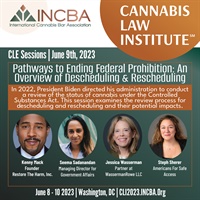
- Average Rating:
- 1
- Bundle:
- CLI2023 Federal Policy Bundle | CLI2023 On-Demand
- Categories:
- Consumption Law | Federal Law | Federal Policy | Policy
- Faculty:
- Steph Sherer | Jessica Wasserman, JD | Seema Sadanandan | Kenny Mack
- Duration:
- 1 Hour 1 Minutes
- Format:
- Audio and Video
- SKU:
- INCBA072023prohibitionOD
- License:
- Short Description:
- Pathways to Ending Federal Prohibition: An Overview of Descheduling & Rescheduling. In 2022, President Biden directed his administration to conduct a review of the status of cannabis under the Controlled Substances Act. This session examines the review process for descheduling and rescheduling and their potential impacts.
- Price:
- $30.00 - $75.00
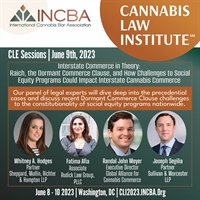
- Average Rating:
- Not yet rated
- Bundle:
- CLI2023 On-Demand | CLI2023 Interstate Commerce Bundle
- Categories:
- Interstate Commerce
- Faculty:
- Fatima Afia | Whitney A. Hodges | Randal John Meyer | Joseph Segilia
- Duration:
- 1 Hour 2 Minutes
- Format:
- Audio and Video
- SKU:
- INCBA072023theoryOD
- License:
- Short Description:
- Interstate Commerce in Theory: Raich, the Dormant Commerce Clause, and How Challenges to Social Equity Programs Could Impact Interstate Cannabis Commerce. From the Supreme Court's decision in Raich v. Gonzales to recent challenges regarding state-level importing and exporting restrictions, the Constitution's Commerce Clause has played a critical role in shaping the legal cannabis industry. Our panel of legal experts will dive deep into the precedential cases and discuss recent dormant Commerce Clause challenges to the constitutionality of social equity programs nationwide.
- Price:
- $30.00 - $75.00
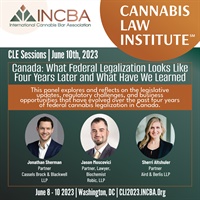
- Average Rating:
- Not yet rated
- Bundle:
- CLI2023 On-Demand | CLI2023 International Opportunities Bundle
- Categories:
- Canada | International Law
- Faculty:
- Sherri Altshuler | Jason Moscovici | Jonathan Sherman
- Duration:
- 1 Hour 2 Minutes
- Format:
- Audio and Video
- SKU:
- INCBA072023canadaOD
- License:
- Short Description:
- Canada: What Federal Legalization Looks Like 4 years Later and What Have We Learned. This panel explores and reflects on the legislative updates, regulatory challenges, and business opportunities that have evolved over the past four years of federal cannabis legalization in Canada.
- Price:
- $30.00 - $75.00
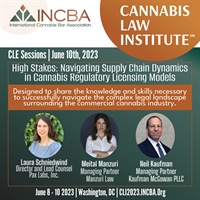
- Average Rating:
- 1
- Bundle:
- CLI2023 On-Demand | CLI2023 State Cannabis Regulation Bundle
- Categories:
- supply chain | Licensing | Regulation law | Regulatory
- Faculty:
- Meital Manzuri | Laura Schniedwind | Neil Kaufman
- Duration:
- 1 Hour 6 Minutes
- Format:
- Audio and Video
- SKU:
- INCBA072023highstakesOD
- License:
- Short Description:
- A comprehensive and dynamic panel designed to equip attorneys with the knowledge and skills necessary to successfully navigate the complex legal landscape surrounding the commercial cannabis industry.
- Price:
- $30.00 - $75.00
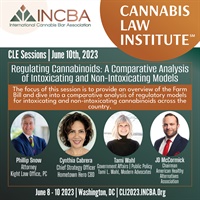
- Average Rating:
- 2
- Bundle:
- CLI2023 On-Demand | CLI2023 State Cannabis Regulation Bundle
- Categories:
- Cannabinoids | Consumption Law | Emerging Cannabinoids | Hemp | Hemp Law
- Faculty:
- Cynthia Cabrera | JD McCormick | Philip Snow | Tami Wahl
- Duration:
- 57 Minutes
- Format:
- Audio and Video
- SKU:
- INCBA072023intoxicatingOD
- License:
- Short Description:
- Regulating Cannabinoids: A Comparative Analysis of Intoxicating and Non-Intoxicating Models. The focus of this session is to provide an overview of the Farm Bill and dive into a comparative analysis of regulatory models for intoxicating and non-intoxicating cannabinoids across the country.
- Price:
- $30.00 - $75.00
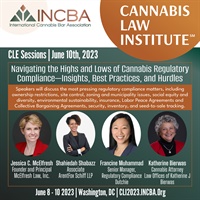
- Average Rating:
- 2
- Bundle:
- CLI2023 On-Demand | CLI2023 State Cannabis Regulation Bundle
- Categories:
- Cannabis | Regulation law | Regulations | Regulatory
- Faculty:
- Jessica C. McElfresh | Shahiedah Shabazz | Francine Muhammad | Katherine Bierwas
- Duration:
- 1 Hour 4 Minutes
- Format:
- Audio and Video
- SKU:
- INCBA072023complianceOD
- License:
- Short Description:
- Navigating the Highs and Lows of Cannabis Regulatory Compliance—Insights, Best Practices, and Hurdles. Examine regulatory compliance “hot topics”, including maintaining state licenses and navigating enforcement actions, and explore best practices for corporate governance, novel partnership agreements such as IP licensing and white labeling, and regulatory considerations of various exit strategies for mature cannabis enterprises.
- Price:
- $30.00 - $75.00
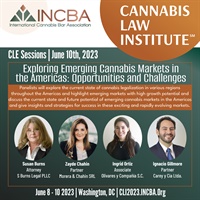
- Average Rating:
- Not yet rated
- Bundle:
- CLI2023 On-Demand | CLI2023 International Opportunities Bundle
- Categories:
- Cross Border Markets & Commerce | Emerging Cannabinoids | Emerging Markets
- Faculty:
- Ignacio Gillmore | Ingrid Ortiz | Zayde Chahin
- Duration:
- 1 Hour 3 Minutes
- Format:
- Audio and Video
- SKU:
- INCBA072023emergingOD
- License:
- Short Description:
- Panelists will explore the current state of cannabis legalization in various regions throughout the Americas and highlight emerging markets with high growth potential. Attendees will leave this panel with a deeper understanding of the current state and future potential of emerging cannabis markets in the Americas, as well as insights and strategies for success in these exciting and rapidly evolving markets.
- Price:
- $30.00 - $75.00
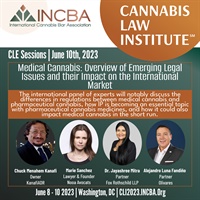
- Average Rating:
- Not yet rated
- Bundle:
- CLI2023 On-Demand | CLI2023 International Opportunities Bundle
- Categories:
- Advertising, Packaging and Labeling | Cannabis Science | Consumption Law | Copyrights and Trademarks | Cross Border Markets & Commerce | Intellectual Property | International Drug Policy | International Law | Medical/Healthcare/Access | Patents & Trade Secrets | Regulations
- Faculty:
- Chuck Menahem Kanafi | Dr. Jayashree Mitra | Marie Sanchez | Alejandro Luna
- Duration:
- 1 Hour 2 Minutes
- Format:
- Audio and Video
- SKU:
- INCBA072023medicalcannOD
- License:
- Short Description:
- Medical Cannabis: Overview of Emerging Legal Issues and their Impact on the International Market. The international panel of experts will notably discuss the differences in regulations between medical cannabis and pharmaceutical cannabis, how IP is becoming an essential topic with pharmaceutical cannabis medicines, and how it could also impact medical cannabis in the short run.
- Price:
- $30.00 - $75.00
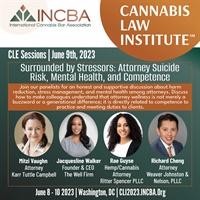
- Average Rating:
- Not yet rated
- Bundle:
- CLI2023 On-Demand
- Faculty:
- Mitzi Vaughn | Rae Guyse | Richard Y. Cheng, Esq., CHC | Jacquesline Walker, LICSW, CSM-C, CCTP
- Duration:
- 1 Hour 1 Minutes
- Format:
- Audio and Video
- SKU:
- INCBA072023stressorsOD
- License:
- Short Description:
- Join our panelists for an honest and supportive discussion about harm reduction, stress management, and mental health among attorneys. Learn how to support colleagues in recovery or who are struggling – and how to recognize and manage these challenges in yourself. Discuss how to make colleagues understand that attorney wellness is not merely a buzzword or a generational difference; it is directly related to competence to practice and meeting duties to clients.
- Price:
- $30.00 - $75.00
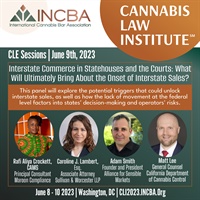
- Average Rating:
- 1
- Bundle:
- CLI2023 Interstate Commerce Bundle | CLI2023 On-Demand
- Categories:
- Interstate Commerce
- Faculty:
- Rafi Aliya Crockett, CAMS | Caroline J. Lambert, Esq. | Matt Lee | Adam Smith
- Duration:
- 53 Minutes
- Format:
- Audio and Video
- SKU:
- INCBA072023statehousesOD
- License:
- Short Description:
- Interstate Commerce in Statehouses and the Courts: What Will Ultimately Bring About the Onset of Interstate Sales? At least four states have seen legislative action involving ways that interstate commerce can be triggered prior to full federal legalization, namely California, Oregon, New Jersey, and blank. This panel will explore the potential triggers that could unlock interstate sales, as well as how the lack of movement at the federal level factors into states' decision-making and operators' risks.
- Price:
- $30.00 - $75.00
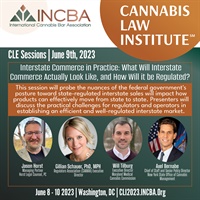
- Average Rating:
- Not yet rated
- Bundle:
- CLI2023 On-Demand | CLI2023 Interstate Commerce Bundle
- Categories:
- Interstate Commerce
- Faculty:
- Jason Horst | Gillian Schauer, PhD, MPH | William Tilburg, JD, MPH | Axel Bernabe
- Duration:
- 1 Hour 1 Minutes
- Format:
- Audio and Video
- SKU:
- INCBA072023inpracticeOD
- License:
- Short Description:
- Interstate Commerce in Practice: What will Interstate commerce actually look like, and how will it be regulated? Assuming interstate commerce will commence before federal legalization, this session will probe the nuances of the federal government's posture toward state-regulated interstate sales will impact how products can effectively move from state to state. Presenters will discuss the practical challenges for regulators and operators in establishing an efficient and well-regulated interstate market.
- Price:
- $30.00 - $75.00
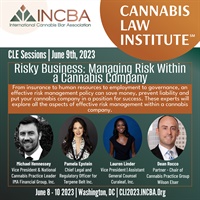
- Average Rating:
- 1
- Bundle:
- CLI2023 On-Demand | CLI2023 Overcoming Operational Hurdles Bundle
- Categories:
- Risk Management | Business | Collections | Corporate Governance | Employment law | Insurance | Operations
- Faculty:
- Pamela Nicole Epstein | Michael F. Hennessey | Lauren Linder | Dean Rocco
- Duration:
- 1 Hour
- Format:
- Audio and Video
- SKU:
- INCBA072023riskOD
- License:
- Short Description:
- Risky Business: Managing Risk Within a Cannabis Company. From insurance to human resources to employment to governance, an effective risk management policy can save money, prevent liability and put your cannabis company in a position for success. These experts will explore all the aspects of effective risk management within a cannabis company.
- Price:
- $30.00 - $75.00
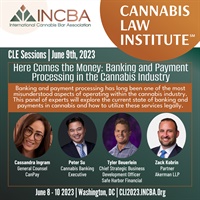
- Average Rating:
- 1
- Bundle:
- CLI2023 On-Demand | CLI2023 Overcoming Operational Hurdles Bundle
- Categories:
- Business | Finance
- Faculty:
- Tyler Beuerlein | Cassandra Ingram | Zachary Kobrin | Peter Su, CTP, CCBP, CCCE, GRCP, GRCA, IDPP, ACBP, CBE
- Duration:
- 1 Hour 4 Minutes
- Format:
- Audio and Video
- SKU:
- INCBA072023bankingOD
- License:
- Short Description:
- Here Comes the Money: Banking and Payment Processing in the Cannabis Industry. Banking and payment processing has long been one of the most misunderstood aspects of operating within the cannabis industry. This panel of experts will explore the current state of banking and payments in cannabis and how to utilize these services legally.
- Price:
- $30.00 - $75.00
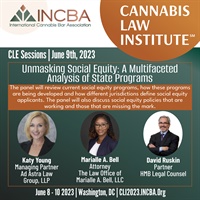
- Average Rating:
- Not yet rated
- Bundle:
- CLI2023 On-Demand
- Categories:
- Social Equity | Specialty Credits
- Faculty:
- Marialle A. Bell | David Ruskin | Katy Young
- Duration:
- 1 Hour 4 Minutes
- Format:
- Audio and Video
- SKU:
- INCBA072023unmaskingOD
- License:
- Short Description:
- In this course, attendees will examine the interconnectedness of social equity initiatives and basic legal principles (i.e. justice, equity, etc.) This program will encourage diversity of thought, give cannabis attorneys more to consider when advising diverse populations and ask participants to walk a mile in a social equity applicant's shoes. Attendees will leave this course with a deeper understanding (and appreciation) of why social equity programs exist, including their role in undoing the harms of cannabis prohibition, how they serve diverse clients and promote equal access to justice, and why social equity programs are necessary.
- Price:
- $30.00 - $75.00

- Average Rating:
- Not yet rated
- Bundle:
- CLI2023 On-Demand
- Categories:
- Consumption Law | Federal Policy | Litigation | Regulations | Regulatory
- Faculty:
- Ian Stewart | Kristina Dahmann | Marion Mariathasan | Barak Cohen | Neil Willner | Paul Demko | Eduardo Provencio, JD
- Duration:
- 1 Hour 15 Minutes
- Format:
- Audio and Video
- SKU:
- INCBA072023summaryOD
- License:
- Short Description:
- Cannabis law and policy continue to quickly evolve and the past year has seen major legal developments for the regulated marijuana and hemp industries. Moderated by Paul Demko, Cannabis Editor at POLITICO, this panel of experts bring their broad legal and policy perspectives to identify and comment upon important court rulings and litigation trends, as well as anticipated changes to the law heading into 2024 on a variety of legal topics.
- Price:
- $30.00 - $75.00

- Average Rating:
- 13
- Bundle:
- Hemp Symposium 2023 On-Demand Bundle
- Categories:
- Hemp | Hemp Law
- Faculty:
- Marie Sanchez | Robert Hoban | Lorenza Romanese | Robert Jappie
- Duration:
- 1 Hour 4 Minutes
- Format:
- Audio and Video
- SKU:
- INCBA042823transatlanticOD
- License:
- Short Description:
- In this session the panelists will discuss international hemp-derived products trade. More specifically, the panelists will offer an overview of what transatlantic trade of hemp-derived products (food products, cosmetic products, vaping products…) for consumer use looks like with a particular focus on import and export of these products from the US market to the EU and/or the UK market(s) and from the EU and/or the UK to the USA.
- Price:
- $30.00 - $75.00
Tags: Hemp Symposium 2023

- Average Rating:
- 13
- Bundle:
- Hemp Symposium 2023 On-Demand Bundle
- Categories:
- Hemp | Hemp Law
- Faculty:
- Pamela Nicole Epstein | Courtney Moran | Shawn Hauser | Rusty Rumley
- Duration:
- 1 Hour 5 Minutes
- Format:
- Audio and Video
- SKU:
- INCBA042823farmbillOD
- License:
- Short Description:
- In this session the panelist will set the stage by discussing the Agricultural Improvement Act, more commonly known as the Farm Bill; specifically, the watershed moment in 2018 where industrial hemp was provided a federally legal pathway. The panel will discuss the unintended consequences created by the definition and function of weight allowance for delta-9 THC and its application to manufactured hemp derived products. The impacts of the definition on the hemp industry, the regulated marijuana industry and overall public health.
- Price:
- $30.00 - $75.00
Tags: Hemp Symposium 2023

- Average Rating:
- 13
- Bundle:
- Hemp Symposium 2023 On-Demand Bundle
- Categories:
- Hemp | Hemp Law
- Faculty:
- Susan Burns | Rod Kight | Glenn McElfresh | Jessica Wasserman, JD
- Duration:
- 1 Hour 2 Minutes
- Format:
- Audio and Video
- SKU:
- INCBA042823microcosmOD
- License:
- Short Description:
- Learn about the hemp-derived Minnesota Model and how it is viewed as a preview to what will happen on the federal level. As goes Minnesota, so goes the rest of the nation? Join local and national speakers for their analysis and predictions, who will also discuss novel/intoxicating hemp-derived cannabinoids and their regulation under both state and federal law, including Delta-8 THC, THC-O, and others.
- Price:
- $30.00 - $75.00
Tags: Hemp Symposium 2023

- Average Rating:
- 14
- Bundle:
- Hemp Symposium 2023 On-Demand Bundle
- Categories:
- Hemp | Hemp Law
- Faculty:
- Ignacio Gillmore | Dr. Jayashree Mitra | Ana Maria Castro | Ingrid Ortiz
- Duration:
- 1 Hour 3 Minutes
- Format:
- Audio and Video
- SKU:
- INCBA042823hempinfoodOD
- License:
- Short Description:
- The panel will focus on the regulations applicable to foodstuff in the US, Mexico, Colombia and Chile. In particular, we will discuss different regulations in connection to dietary supplements, nutraceuticals, advertisement and further challenging issues for the industry, to later focus on the approach that these regulations have regarding the use of hemp in foodstuff products and future challenges in this regard.
- Price:
- $30.00 - $75.00
Tags: Hemp Symposium 2023
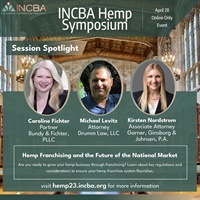
- Average Rating:
- 10
- Bundle:
- Hemp Symposium 2023 On-Demand Bundle
- Categories:
- Hemp | Hemp Law
- Faculty:
- Caroline Fichter | Kirsten Nordstrom | Michael Levitz
- Duration:
- 1 Hour
- Format:
- Audio and Video
- SKU:
- INCBA042823franchisingOD
- License:
- Short Description:
- The franchise business model offers hemp business owners the opportunity to grow their brand nationally while reducing their startup and operational costs. It offers prospective hemp franchisees the chance to own their own business while benefiting from an established brand and operational system. But a poorly created franchise system or an “accidental” franchise, can expose hemp businesses to the risk of regulatory investigation, litigation, and the loss of key IP such as trademarks and trade secrets. Conflicting state regulations and the lack of significant federal guidance makes franchising a hemp business even more complex.
- Price:
- $30.00 - $75.00
Tags: Hemp Symposium 2023

- Average Rating:
- 7
- Bundle:
- Litigation Symposium 2023 On-Demand Bundle
- Categories:
- Litigation
- Faculty:
- Stacey Jackson | Ian Stewart | Jasmine Wetherell | Bryna Dahlin
- Duration:
- 55 Minutes
- Format:
- Audio and Video
- SKU:
- INCBA032123liabilityOD
- License:
- Short Description:
- Evolving cannabis product risks have the potential to result in enormous future liability for which cannabis and hemp companies are currently unprepared. This session will clarify those risks and discuss how embracing a mix of legal reform, policy changes and adoption of traditional risk management principles may prevent future product risk issues from damaging market sustainability.
- Price:
- $30.00 - $75.00

- Average Rating:
- 6
- Bundle:
- Litigation Symposium 2023 On-Demand Bundle
- Categories:
- Litigation
- Faculty:
- Leo J. Hurley, Jr. | Jessica C. McElfresh | Tom Haren
- Duration:
- 1 Hour 1 Minutes
- Format:
- Audio and Video
- SKU:
- INCBA032123investigationsOD
- License:
- Short Description:
- To successfully navigate a government investigation of a licensed cannabis client, an attorney needs to assess which government agency (or agencies) is conducting the investigation, what are the potential outcomes, and what conflicts of interest may exist – all while taking in information in real time and often dealing with stressed clients. Any attorney may need to conduct an internal investigation at the same – and consider when to step aside and call in an expert. This panel will discuss responding to subpoenas, dealing with evolving disciplinary rules, respecting the Fourth and Fifth Amendment rights of individuals, and properly providing Upjohn warnings.
- Price:
- $30.00 - $75.00
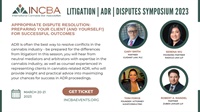
- Average Rating:
- 6
- Bundle:
- Litigation Symposium 2023 On-Demand Bundle
- Categories:
- Litigation
- Faculty:
- Gary M Smith, Esq. | Robert Mandel | Serena Wu | Toni Forge
- Duration:
- 1 Hour 2 Minutes
- Format:
- Audio and Video
- SKU:
- INCBA032123disputeOD
- License:
- Short Description:
- Maintain privilege while representing an entity client amid overinvolved founders; parent and subsidiary litigation; and mergers and acquisitions.
- Price:
- $30.00 - $75.00

- Average Rating:
- 4
- Bundle:
- Litigation Symposium 2023 On-Demand Bundle
- Categories:
- Litigation | Ethics
- Faculty:
- Jessica C. McElfresh | Michelle Mabugat | Deborah Wolfe | Katy Young
- Duration:
- 1 Hour 2 Minutes
- Format:
- Audio and Video
- SKU:
- INCBA032123privilegeOD
- License:
- Short Description:
- Maintain privilege while representing an entity client amid overinvolved founders; parent and subsidiary litigation; and mergers and acquisitions.
- Price:
- $30.00 - $75.00

- Average Rating:
- 11
- Bundle:
- Litigation Symposium 2023 On-Demand Bundle
- Categories:
- Litigation
- Faculty:
- Shane Pennington
- Duration:
- 1 Hour 6 Minutes
- Format:
- Audio and Video
- SKU:
- INCBA032023spotlightOD
- License:
- Short Description:
- Please join Shane Pennington (Counsel, Vicente LLP) as he discusses various aspects of Impact Litigation & the Changing Terrain in the legal cannabis market. This course’s topics will include: the current state of play, historical precedent that got us into the situation we are in today, and what the future may hold.
- Price:
- $30.00 - $75.00
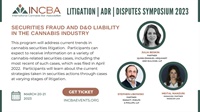
- Average Rating:
- 7
- Bundle:
- Litigation Symposium 2023 On-Demand Bundle
- Categories:
- Litigation
- Faculty:
- Meital Manzuri | Julia Beskin | Stephen Libowski
- Duration:
- 55 Minutes
- Format:
- Audio and Video
- SKU:
- INCBA032123securitiesOD
- License:
- Short Description:
- This program will address current trends in cannabis securities litigation. Participants can expect to receive information on a variety of cannabis-related securities cases, including the most recent of such cases, which was filed in April 2022. Participants will learn about the current strategies taken in securities actions through cases at varying stages of litigation. Upon completion of this program, participants should expect to be able to identify common causes of action levied against cannabis-related entities and strategies those entities can implement to mitigate risk.
- Price:
- $30.00 - $75.00

- Average Rating:
- 17
- Bundle:
- Hemp Symposium 2023 On-Demand Bundle
- Categories:
- Hemp | Hemp Law
- Faculty:
- Jason Tarasek | Marie Sanchez | Kai-Friedrich Niermann | Andrea Steel
- Duration:
- 1 Hour 15 Minutes
- Format:
- Audio and Video
- SKU:
- INCBA042823caselawOD
- License:
- Short Description:
- Case Law Update: A comprehensive update on recent Hemp case law
- Price:
- $30.00 - $75.00
Tags: Hemp Symposium 2023

- Average Rating:
- 15
- Categories:
- Intellectual Property
- Faculty:
- Jason Moscovici | Marcelo Pomeranz | Dr. Jayashree Mitra | Margret Knitter, LL.M. | Nicole A. Katsin | Juan Luis Serrano Leets
- Duration:
- 1 Hour 28 Minutes
- Format:
- Audio and Video
- SKU:
- INCBA04282022od
- License:
- Short Description:
- From patents and plant breeder’s rights, to trademarks and trade secrets, participants will learn how to approach the evolving practice of cannabis IP across several illustrative jurisdictions including Germany, Canada and the United States.
- Price:
- $30.00 - $75.00

- Average Rating:
- 18
- Categories:
- Alternative Dispute Resolution
- Faculty:
- Phillip Neiman | Chuck Menahem Kanafi | Diana Kruze
- Duration:
- 1 Hour 23 Minutes
- Format:
- Audio and Video
- SKU:
- INCBA04132022od
- License:
- Short Description:
- A practical guide on pointers and pitfalls in crafting ADR clauses in contracts to save your clients time and money. The panel will discuss everything from choice of law, venue selection, arbitrator qualifications, "cooling off" and mediation requirements, discovery provisions and appellate options.
- Price:
- $30.00 - $75.00
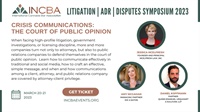
- Average Rating:
- 9
- Bundle:
- Litigation Symposium 2023 On-Demand Bundle
- Categories:
- Litigation
- Faculty:
- Daniel Koffmann | Jessica C. McElfresh | Amy McGahan
- Duration:
- 55 Minutes
- Format:
- Audio and Video
- SKU:
- INCBA032023crisisOD
- License:
- Short Description:
- Crisis communications for cannabis companies; media messaging; attorney-client privilege with consultants and public relations companies
- Price:
- $30.00 - $75.00

- Average Rating:
- 15
- Categories:
- Webinar with CLE credit | Litigation | Administrative Law | Regulation law
- Faculty:
- Chris Eggers | Mitzi Vaughn | Michael F. Hennessey
- Duration:
- 1 Hour 1 Minutes
- Format:
- Audio and Video
- SKU:
- INCBA030922OD
- License:
- Short Description:
- Learn about the licensing considerations, continuing obligations, and risk related to physical security in the cannabis industry, from mapping your business to liaising with law enforcement, and from environmental and procedural security to best practices in security employee training, join us to go through the intricacies of security in the cannabis industry.
- Price:
- $30.00 - $75.00
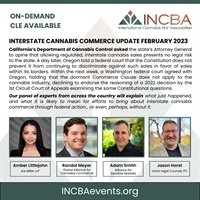
- Average Rating:
- 27
- Categories:
- Interstate Commerce
- Faculty:
- Jason Horst | Amber Littlejohn, Esq. | Adam Smith | Randal John Meyer
- Duration:
- 1 Hour
- Format:
- Audio and Video
- SKU:
- INCBA022323interstateOD
- License:
- Short Description:
- Week of events in California, Oregon & Washington shake up interstate cannabis commerce landscape. What happened, & what does it all mean?
- Price:
- $30.00 - $75.00
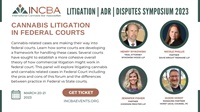
- Average Rating:
- 6
- Bundle:
- Litigation Symposium 2023 On-Demand Bundle
- Categories:
- Litigation
- Faculty:
- Henry Wykowski | Jason Horst | Jennifer Fisher | Nicole Phillis
- Duration:
- 56 Minutes
- Format:
- Audio and Video
- SKU:
- INCBA032123courtsOD
- License:
- Short Description:
- Cannabis-related cases are making their way into federal courts. Learn how some courts are developing a framework for handling these cases.
- Price:
- $30.00 - $75.00
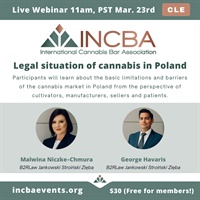
- Average Rating:
- Not yet rated
- Categories:
- International Law | International Webinar
- Faculty:
- Malwina Niczke – Chmura | George Havaris
- Duration:
- 1 Hour 11 Minutes
- Format:
- Audio and Video
- SKU:
- INCBA03232022od
- License:
- Short Description:
- Participants will learn about the basic limitations and barriers of the cannabis market in Poland from the perspective of cultivators, manufacturers, sellers and patients.
- Price:
- $30.00 - $75.00
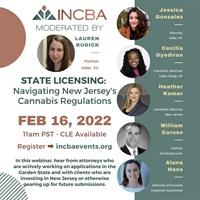
- Average Rating:
- 17
- Categories:
- Licensing | Licensing and Permitting | Regulation law | Webinar with CLE credit
- Faculty:
- Lauren Rudick | Jessica F. Gonzalez, Esq. | Cecilia Oyediran | Heather Kumer | William Caruso | Alana M. Hans-Cohen
- Duration:
- 1 Hour 2 Minutes
- Format:
- Audio and Video
- SKU:
- INCBA02162022OD
- License:
- Short Description:
- In this session, hear from attorneys who are actively working on applications in the Garden State and with clients who are investing in New Jersey or otherwise gearing up for future submissions. Learn about unique-to-New Jersey license types, such as the “Conditional License,” enabling prospective operators to apply for a license without site control (subject to income restrictions), the “Micro-license,” a 2500 square foot facility for which there are no caps (subject to residency requirements), priorities in licensing, and creative opportunities to participate in the market distinct from ownership (via “Financial Source Agreement” or “Management Services Agreement”). Also learn about how the regulatory process is unfolding and how administrative delays are impacting the licensing process and accompanying operational timelines and legal transactions.
- Price:
- $30.00 - $75.00
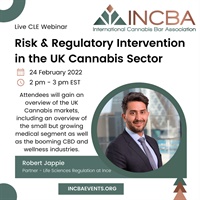
- Average Rating:
- 3
- Categories:
- Administrative Law | Cannabis | Cross Border Markets & Commerce | International Webinar | Regulations
- Faculty:
- Robert Jappie
- Duration:
- 1 Hour 3 Minutes
- Format:
- Audio and Video
- SKU:
- INCBA02242022OD
- License:
- Short Description:
- Attendees will gain an overview of the UK Cannabis markets, including an overview of the small but growing medical segment, as well as the booming CBD and wellness industries.
- Price:
- $30.00 - $75.00

- Average Rating:
- 21
- Faculty:
- Fatima Afia | Lauren Rudick | Michelle Bodian | Neil Willner
- Duration:
- 1 Hour
- Format:
- Audio and Video
- SKU:
- INCBA05192022od
- License:
- Short Description:
- Given the rapid developments that have taken place in just a short year, clients looking to enter the New York cannabis market will likely have many questions. Prepare yourself for these inevitable conversations now by signing up for our webinar where our legal experts will: (i) offer a general overview of the MRTA and adult-use licensing; (ii) break down recently-created adult-use conditional license types, the applicable eligibility criteria, and the potential impact of these conditional licenses on the State’s broader social and economic equity program; and (iii) explain how the State’s medical regulations will change if the proposed changes are adopted and what that means for the existing medical market, the adult-use market, and beyond. If you’re looking for a lively and informative discussion about all things cannabis in the Empire State, look no further – we’ve got you covered!
- Price:
- $30.00 - $75.00
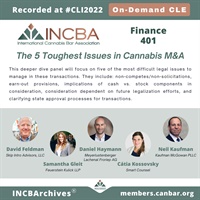
- Average Rating:
- 1
- Bundle:
- CLI2022 On-Demand
- Categories:
- Finance | Business | Corporate Governance | Insurance | Tax Law
- Faculty:
- David Feldman | Catia Kossovsky, Esq. | Samantha Gleit | Neil Kaufman | Daniel Haymann, MBA
- Duration:
- 1 Hour 9 Minutes
- Format:
- Audio and Video
- SKU:
- INCBA100222ToughOD
- License:
- Short Description:
- In any industry, M&A is challenging. In cannabis, the issues can be even more complex. This deeper dive panel will focus on five of the most difficult legal issues to manage in these transactions.
- Price:
- $30.00 - $75.00
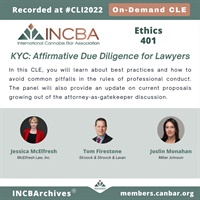
- Average Rating:
- 3
- Bundle:
- CLI2022 On-Demand | INCBA’s Cannabis Law Crash Course Bundle
- Categories:
- Business of Law | Mindfullness | Regulations
- Faculty:
- Jessica C. McElfresh | Joslin E. Monahan | Tom Firestone
- Duration:
- 1 Hour 25 Minutes
- Format:
- Audio and Video
- SKU:
- INCBA072022KYCOD
- License:
- Short Description:
- In this CLE, you will learn about best practices and how to avoid common pitfalls in the rules of professional conduct. The panel will also provide an update on current proposals growing out of the attorney-as-gatekeeper discussion.
- Price:
- $30.00 - $75.00
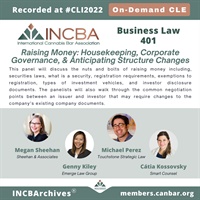
- Average Rating:
- 1
- Bundle:
- CLI2022 On-Demand
- Categories:
- Business | Corporate Governance | Finance
- Faculty:
- Megan Sheehan | Genny Kiley | Catia Kossovsky, Esq. | Michael Perez
- Duration:
- 1 Hour 13 Minutes
- Format:
- Audio and Video
- SKU:
- INCBA072022MonOD
- License:
- Short Description:
- This is the final installment of INCBA’s Business Law - Formation series. This panel will discuss the nuts and bolts of raising money including, securities laws, what is a security, registration requirements, exemptions to registration, types of investment vehicles, and investor disclosure documents.
- Price:
- $30.00 - $75.00

- Average Rating:
- Not yet rated
- Bundle:
- CLI2022 On-Demand | The Comprehensive Hemp Bundle
- Categories:
- Administrative Law | Consumption Law | Federal Law | Hemp | Hemp Law | Licensing
- Faculty:
- Jessica Wasserman, JD | Heather Azzi | Mai T. Dinh | Christopher Arneson
- Duration:
- 1 Hour 15 Minutes
- Format:
- Audio and Video
- SKU:
- INCBA072022ConDevOD
- License:
- Short Description:
- Since the 2018 Farm Bill legalized hemp, there are now two distinct commercial industries: pharmaceuticals / wellness and industrial. In the pharmaceutical and consumer wellness areas, there is an explosion of innovation and new products. In the industrial market, there is increasing interest in light of sustainability and carbon capture considerations.
- Price:
- $30.00 - $75.00
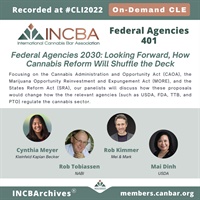
- Average Rating:
- 2
- Bundle:
- CLI2022 On-Demand
- Categories:
- Business of Law | Federal Law | Regulation law | Regulations
- Faculty:
- Cynthia Meyer | Mr. Robert Martin Tobiassen, J.D., LLM Taxation | Rob Kimmer, Esq. | Mai T. Dinh
- Duration:
- 1 Hour 12 Minutes
- Format:
- Audio and Video
- SKU:
- INCBA072022Fed2030OD
- License:
- Short Description:
- Focusing on the Cannabis Administration and Opportunity Act (CAOA), the Marijuana Opportunity Reinvestment and Expungement Act (MORE), and the States Reform Act (SRA), our panelists will discuss how these proposals would change how the the relevant agencies (such as USDA, FDA, TTB, and PTO) regulate the cannabis sector.
- Price:
- $30.00 - $75.00
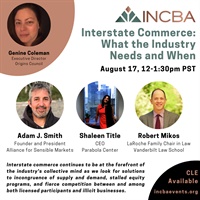
- Average Rating:
- 13
- Categories:
- Business | Cannabis | Cross Border Markets & Commerce | Interstate Commerce
- Faculty:
- Adam Smith | Shaleen Title, Esq. | Robert Mikos | Genine Coleman
- Duration:
- 1 Hour 31 Minutes
- Format:
- Audio and Video
- SKU:
- INCBA08172022od
- License:
- Short Description:
- Interstate commerce continues to be at the forefront of the industry's collective mind as we look for solutions to incongruence of supply and demand, stalled equity programs, and fierce competition between and among both licensed participants and illicit businesses.
- Price:
- $30.00 - $75.00
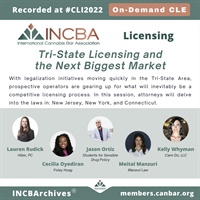
- Average Rating:
- Not yet rated
- Bundle:
- CLI2022 On-Demand
- Categories:
- Licensing | Licensing and Permitting | Regulation law | Regulations
- Faculty:
- Lauren Rudick | Cecilia Oyediran | Meital Manzuri | Kelly Whyman | Jason Ortiz
- Duration:
- 1 Hour 16 Minutes
- Format:
- Audio and Video
- SKU:
- INCBA090522TriOD
- License:
- Short Description:
- With legalization initiatives moving quickly in the Tri-State Area, prospective operators are gearing up for what will inevitably be a competitive licensing process. In this session, attorneys will delve into the laws in: New Jersey, New York, and Connecticut.
- Price:
- $30.00 - $75.00
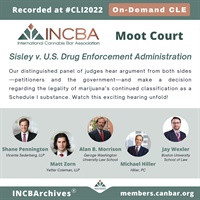
- Average Rating:
- Not yet rated
- Bundle:
- CLI2022 On-Demand
- Categories:
- Federal Law | Hemp Law | Regulation law
- Faculty:
- Shane Pennington | Matt Zorn | Alan B. Morrison | Michael Hiller | Jay Wexler
- Duration:
- 1 Hour 19 Minutes
- Format:
- Audio and Video
- SKU:
- INCBA090522MootOD
- License:
- Short Description:
- Our distinguished panel of judges will hear argument from both sides—petitioners and the government—and make a decision regarding the legality of marijuana’s continued classification as a Schedule I substance. Come see the exciting hearing unfold!
- Price:
- $30.00 - $75.00
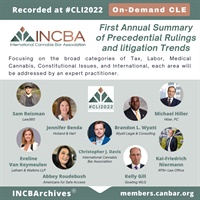
- Average Rating:
- Not yet rated
- Bundle:
- CLI2022 On-Demand
- Faculty:
- Sam Reisman | Christopher J. Davis | Michael Hiller | Jennifer Benda | Kai-Friedrich Niermann | Eveline Van Keymeulen | Kelly Gill | Brandon Wyatt | ....
- Duration:
- 1 Hour 33 Minutes
- Format:
- Audio and Video
- SKU:
- INCBA090522AnRulOD
- License:
- Short Description:
- Focusing on the broad categories of Tax, Labor, Medical Cannabis, Constitutional Issues, and International, each area will be addressed by an expert practitioner.
- Price:
- $30.00 - $75.00
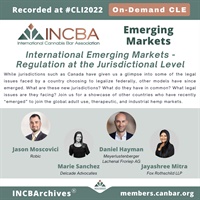
- Average Rating:
- Not yet rated
- Bundle:
- CLI2022 On-Demand
- Categories:
- Emerging Markets | International Law | International Webinar
- Faculty:
- Jason Moscovici | Marie Sanchez | Dr. Jayashree Mitra | Daniel Haymann, MBA
- Duration:
- 1 Hour 6 Minutes
- Format:
- Audio and Video
- SKU:
- INCBA090522intlregOD
- License:
- Short Description:
- While jurisdictions such as Canada have given us a glimpse into some of the legal issues faced by a country choosing to legalize federally, other models have since emerged. What are these new jurisdictions? What do they have in common? What legal issues are they facing? Join us for a showcase of other countries who have recently “emerged” to join the global adult use, therapeutic, and industrial hemp markets.
- Price:
- $30.00 - $75.00
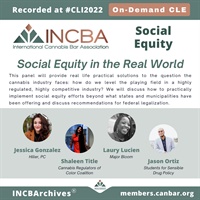
- Average Rating:
- Not yet rated
- Bundle:
- CLI2022 On-Demand
- Categories:
- Social Equity
- Faculty:
- Jessica F. Gonzalez, Esq. | Laury Lucien, Esq. | Jason Ortiz | Shaleen Title, Esq.
- Duration:
- 1 Hour 3 Minutes
- Format:
- Audio and Video
- SKU:
- INCBA090522SocEqOD
- License:
- Short Description:
- This panel will provide real life practical solutions to the question the cannabis industry faces: how do we level the playing field in a highly regulated, highly competitive industry? We will discuss how to practically implement social equity efforts beyond what states and municipalities have been offering and discuss recommendations for federal legalization.
- Price:
- $30.00 - $75.00
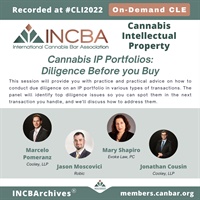
- Average Rating:
- Not yet rated
- Bundle:
- CLI2022 On-Demand
- Categories:
- Intellectual Property | Patents & Trade Secrets
- Faculty:
- Marcelo Pomeranz | Mary Shapiro, JD, MBA | Jason Moscovici | Jonathan Cousin
- Duration:
- 1 Hour 2 Minutes
- Format:
- Audio and Video
- SKU:
- INCBA090522CanIPOD
- License:
- Short Description:
- This session will provide you with practice and practical advice on how to conduct due diligence on an IP portfolio in various types of transactions. The panel will identify top diligence issues so you can spot them in the next transaction you handle, and we'll discuss how to address them.
- Price:
- $30.00 - $75.00
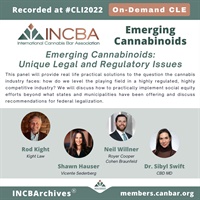
- Average Rating:
- Not yet rated
- Bundle:
- CLI2022 On-Demand
- Categories:
- Emerging Cannabinoids | Cannabis | Cannabis Science
- Faculty:
- Neil Willner | Shawn Hauser | Rod Kight | Sibyl Swift
- Duration:
- 1 Hour
- Format:
- Audio and Video
- SKU:
- INCBA09302022emercannOD
- License:
- Short Description:
- This panel will provide real life practical solutions to the question the cannabis industry faces: how do we level the playing field in a highly regulated, highly competitive industry? We will discuss how to practically implement social equity efforts beyond what states and municipalities have been offering and discuss recommendations for federal legalization.
- Price:
- $30.00 - $75.00
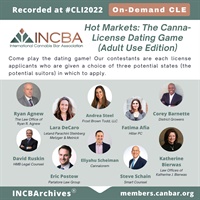
- Average Rating:
- Not yet rated
- Bundle:
- CLI2022 On-Demand
- Categories:
- Licensing | Licensing and Permitting
- Faculty:
- Ryan Agnew | David Ruskin | Lara DeCaro | Eric D Postow | Andrea Steel | Eliyahu Scheiman, J.D. | Fatima Afia | Steve Schain | ....
- Duration:
- 1 Hour
- Format:
- Audio and Video
- SKU:
- INCBA09302022hotmktsOD
- License:
- Short Description:
- Come play the dating game! Our contestants are each license applicants who are given a choice of three potential states (the potential suitors) in which to apply.
- Price:
- $30.00 - $75.00

- Average Rating:
- Not yet rated
- Categories:
- International Drug Policy | International Law | International Webinar | Regulation law | Regulations
- Faculty:
- Kai-Friedrich Niermann | Juan Luis Serrano Leets | John Walsh | Jack Lloyd | Daniel Podestá Farina
- Duration:
- 1 Hour 2 Minutes
- Format:
- Audio and Video
- SKU:
- INCBA09302022maverickOD
- License:
- Short Description:
- Join us for a discussion that focuses on the international legislative mechanisms that regulated countries have used to address their obligations under the UN Single Convention.
- Price:
- $30.00 - $75.00

- Average Rating:
- 1
- Bundle:
- CLI2022 On-Demand
- Categories:
- Federal Policy | Federal Law | Policy | Regulation law | Regulations
- Faculty:
- Saphira Galoob | Amber Littlejohn, Esq. | John Hudak, Ph.D.
- Duration:
- 1 Hour 4 Minutes
- Format:
- Audio and Video
- SKU:
- INCBA101022fedpolOD
- License:
- Short Description:
- Two DC insiders, Saphira Galoob, Managing Director of the Liaison Group, and Amber Littlejohn, Executive Director of the Minority Cannabis Business Association, will discuss a bird's-eye view of Democratic and Republican approaches to federal cannabis reform.
- Price:
- $30.00 - $75.00
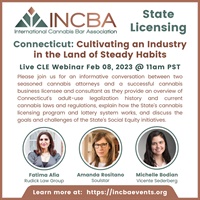
- Average Rating:
- 2
- Categories:
- Emerging Markets | Licensing | Licensing and Permitting
- Faculty:
- Amanda Rositano | Michelle Bodian | Fatima Afia
- Duration:
- 1 Hour
- Format:
- Audio and Video
- SKU:
- INCBA02082023connlicOD
- License:
- Short Description:
- Connecticut State Licensing: Cultivating an Industry in the Land of Steady Habits. Learn about pending litigation against the state due to the licensing and lottery system and the program’s apparent failure to meet social equity goals.
- Price:
- $30.00 - $75.00

- Average Rating:
- 3
- Faculty:
- Debbie Churgai | Christopher J. Davis
- Duration:
- 1 Hour
- Format:
- Audio and Video
- License:
- Short Description:
- Is access to medical cannabis expanding? Or is adult use overtaking medical cannabis? Abbey Roudebush will present the results of Americans for Safe Access’s annual State of the State report.
- Price:
- $30.00 - $75.00

- Average Rating:
- 13
- Categories:
- Web3 | Metaverse
- Faculty:
- Belle Borovik | Steve Schain | Evan Horowitz | Shabnam Malek
- Duration:
- 1 Hour 3 Minutes
- Format:
- Audio and Video
- SKU:
- INCBA03082023metaOD
- License:
- Short Description:
- In this session speakers will join Belle Borovik, Head of IP at Chia Network Inc., to share their knowledge and understanding of Web 3.0, including: addressing issues central to blockchain and cryptocurrency, such as securities implications around tokenization and fiat; providing an overview of IP issues related to the Metaverse and NFTs; and discussing clients' need for ongoing support with the same old issues in this new disruptive space.
- Price:
- $30.00 - $75.00
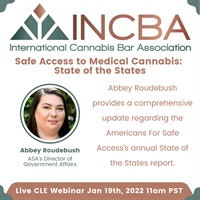
- Average Rating:
- 13
- Categories:
- Administrative Law | Litigation | Regulation law | Webinar with CLE credit
- Faculty:
- Abbey Roudebush
- Duration:
- 1 Hour
- Format:
- Audio and Video
- SKU:
- INCBA011922OD
- License:
- Short Description:
- Since 2014, Americans For Safe Access’s annual State of the States report has assessed the strength of medical cannabis programs by assigning grades to each of the 50 states, the District of Columbia and the U.S. territories. The 2021 Americans for Safe Access State of the States Report will feature new report card formats and scoring that highlight key areas of medical cannabis policy that affect patient needs.
- Price:
- $30.00 - $75.00
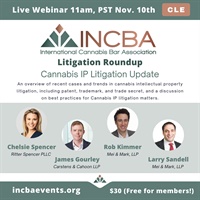
- Average Rating:
- 16
- Categories:
- Cannabis | Copyrights and Trademarks | Federal Law | Intellectual Property | IP law | Licensing | Licensing and Permitting | Litigation | Patents & Trade Secrets | Regulation law
- Faculty:
- Chelsie Spencer | James Gourley | Rob Kimmer, Esq. | Larry Sandell
- Duration:
- 1 Hour 9 Minutes
- Format:
- Audio and Video
- License:
- Short Description:
- Webinar: Cannabis IP Litigation Update - Live and On-Demand. A discussion about best practices for litigation cannabis IP matters.
- Price:
- $30.00 - $75.00

- Average Rating:
- 2
- Categories:
- Business of Law | Cannabis | Ethics | Hemp | Litigation | Mindfullness | Social Equity | Substance Abuse
- Faculty:
- Hannah Stitt | Paige Pembrook | Jonathan Gallo | Lauren Linder
- Duration:
- 48 Minutes
- Format:
- Audio and Video
- SKU:
- INCBA08122021OD
- License:
- Short Description:
- After becoming a cannabis lawyer, you need to ensure you are an ethical one. Learn from our panelists about the issues they confronted as soon as they entered cannabis practice, and what they never expected.
- Price:
- $30.00 - $75.00
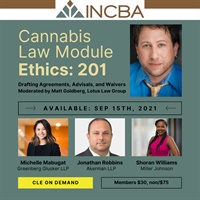
- Average Rating:
- Not yet rated
- Categories:
- Administrative Law | Business of Law | Cannabis | Cannabis Law Sessions | Ethics | Intellectual Property | Licensing and Permitting
- Faculty:
- Matthew A. Goldberg | Michelle Mabugat | Jonathan Robbins | Shoran Williams
- Duration:
- 54 Minutes
- Format:
- Audio and Video
- SKU:
- INCBA08122021OD
- License:
- Short Description:
- Entering cannabis practice will require specialized retainer agreements, advisal letters, and conflict waivers. Our panelists explain in detail.
- Price:
- $30.00 - $75.00
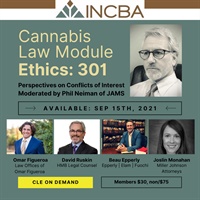
- Average Rating:
- 1
- Categories:
- Alternative Dispute Resolution | Business of Law | Cannabis | Copyrights and Trademarks | Corporate Governance | Ethics | Intellectual Property | Licensing | Licensing and Permitting | Patents & Trade Secrets
- Faculty:
- Phillip Neiman | Omar Figueroa | David Ruskin | Beau Epperly
- Duration:
- 1 Hour 35 Minutes
- Format:
- Audio and Video
- SKU:
- INCBA08122021HMCOD
- License:
- Short Description:
- Most lawyers dream of having many clients seeking their services no matter how problematic. Our panelists debate how to manage conflicts of interest during competitive licensing and applications.
- Price:
- $30.00 - $75.00
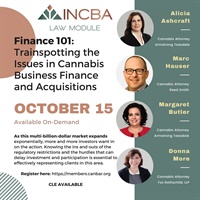
- Average Rating:
- 2
- Categories:
- Business of Law | Cannabis | Ethics | Hemp | Litigation | Mindfullness | Social Equity | Substance Abuse
- Faculty:
- Alicia Ashcraft | Marc Hauser | Margaret Butler | Donna More
- Duration:
- 1 Hour 3 Minutes
- Format:
- Audio and Video
- SKU:
- INCBA101521.101OD
- License:
- Short Description:
- This panel of experienced practitioners will provide insight and guidance in spotting and trouble shooting the issues at the early stages of the evaluation and negotiation of cannabis business transactions.
- Price:
- $30.00 - $75.00
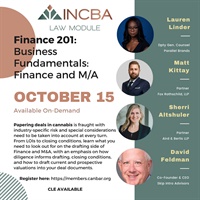
- Average Rating:
- 1
- Categories:
- Business of Law | Cannabis | Ethics | Hemp | Litigation | Mindfullness | Social Equity | Substance Abuse
- Faculty:
- Lauren Linder | Matthew Kittay | Sherri Altshuler | David Feldman
- Duration:
- 1 Hour 7 Minutes
- Format:
- Audio and Video
- SKU:
- INCBA101521.201OD
- License:
- Short Description:
- From LOIs to closing conditions, learn what you need to look out for on the drafting side of Cannabis Business Finance and M&A
- Price:
- $30.00 - $75.00
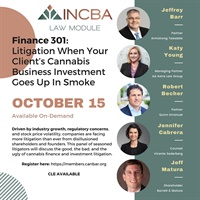
- Average Rating:
- Not yet rated
- Categories:
- Business of Law | Cannabis | Ethics | Hemp | Litigation | Mindfullness | Social Equity | Substance Abuse
- Faculty:
- Jeffrey Barr | Robert Becher | Jennifer Cabrera | Jeffrey Matura | Katy Young
- Duration:
- 1 Hour 2 Minutes
- Format:
- Audio and Video
- SKU:
- INCBA101521.301OD
- License:
- Short Description:
- This panel of seasoned litigators will discuss the good, the bad, and the ugly of cannabis finance and investment litigation.
- Price:
- $30.00 - $75.00

- Average Rating:
- 2
- Bundle:
- INCBA’s Cannabis Law Crash Course Bundle
- Categories:
- Administrative Law | Cannabis | Federal Law | Regulation law | Regulations
- Faculty:
- Matt Zorn | Shane Pennington | Marisa Malek
- Duration:
- 56 Minutes
- Format:
- Audio and Video
- SKU:
- INCBA08152021CFROD
- License:
- Short Description:
- How is Cannabis regulated at the federal level and how did we get here? What lessons have we learned from the regulation of hemp?
- Price:
- $30.00 - $75.00

- Average Rating:
- Not yet rated
- Categories:
- Advertising, Packaging and Labeling | Business | Cannabis | Consumption Law | Copyrights and Trademarks | Cross Border Markets & Commerce | Ethics | Federal Law | Hemp | Hemp Law | Regulation law | Regulations
- Faculty:
- Matt Zorn | Cynthia Meyer | Chelsie Spencer
- Duration:
- 1 Hour 8 Minutes
- Format:
- Audio and Video
- SKU:
- INCBA081521FEOD
- License:
- Short Description:
- Discussing in more detail what marketers of a Cannabis product should consider, what limitations and guardrails exist, and more.
- Price:
- $30.00 - $75.00
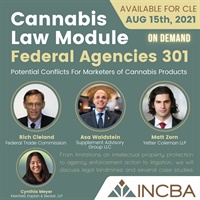
- Average Rating:
- Not yet rated
- Categories:
- Advertising, Packaging and Labeling | Business | Consumption Law | Copyrights and Trademarks | Cross Border Markets & Commerce | Ethics | Federal Law | Intellectual Property | Regulation law
- Faculty:
- Cynthia Meyer | Rich Cleland | Asa Waldstein | Matt Zorn
- Duration:
- 1 Hour 14 Minutes
- Format:
- Audio and Video
- SKU:
- INCBA07142021PCMOD
- License:
- Short Description:
- Discover potential conflicts related to Federal agencies for marketers of Cannabis products, from limitations on intellectual property protection to agency enforcement action to litigation.
- Price:
- $30.00 - $75.00

- Average Rating:
- 21
- Categories:
- Consumption Law | Federal Law | Medical/Healthcare/Access | Policy | Regulation law | Regulations | Webinar with CLE credit
- Faculty:
- Amber Littlejohn, Esq. | Patrick Goggin | Garrett Graff
- Duration:
- 1 Hour 11 Minutes
- Format:
- Audio and Video
- SKU:
- INCBA08112021OD
- License:
- Short Description:
- Exploring the road to Federal Food and Drug Administration regulation of medical cannabis products.
- Price:
- $30.00 - $75.00

- Average Rating:
- 3
- Bundle:
- The Comprehensive Hemp Bundle
- Categories:
- Federal Law | International Law | International Webinar | Hemp | Hemp Law
- Faculty:
- Giacomo Bulleri | Lorenza Romanese | Sergio Martines | Cinzia Citti
- Duration:
- 1 Hour 10 Minutes
- Format:
- Audio and Video
- SKU:
- INCBA07282021OD
- License:
- Short Description:
- An evaluation of the European perspectives and the expected repercussions on Italy.
- Price:
- $30.00 - $75.00
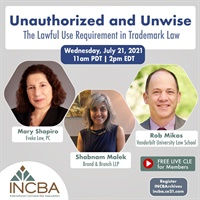
- Average Rating:
- 21
- Categories:
- Business | Copyrights and Trademarks | Federal Law | Intellectual Property | IP law
- Faculty:
- Robert Mikos | Shabnam Malek | Mary Shapiro, JD, MBA
- Duration:
- 56 Minutes
- Format:
- Audio and Video
- SKU:
- INCBA072121UNOD
- License:
- Short Description:
- This CLE explores whether a mark owner has used its mark to sell improperly labeled soap or an illicit drug, the PTO has no mandate, and no convincing policy reason, to deny the owner the substantial benefits of registration.
- Price:
- $30.00 - $75.00

- Average Rating:
- 9
- Categories:
- Business | Business of Law | Corporate Governance | Social Equity
- Faculty:
- Stephan Ferris | Sahar Ayinehsazian | Mitzi Vaughn | Ati P. Khatri
- Duration:
- 1 Hour
- Format:
- Audio and Video
- SKU:
- INCBA05272021OD
- License:
- Short Description:
- This webinar will review the different types of internal documents which are needed for a business entity in the cannabis industry, and key considerations for drafting
- Price:
- $30.00 - $75.00
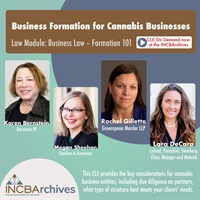
- Average Rating:
- 12
- Bundle:
- INCBA’s Cannabis Law Crash Course Bundle
- Categories:
- Business | Business of Law | Cannabis | Corporate Governance | Federal Law | Licensing and Permitting | Policy
- Faculty:
- Megan Sheehan | Karen Bernstein | Rachel Gillette | Lara DeCaro
- Duration:
- 1 Hour 34 Minutes
- Format:
- Audio and Video
- SKU:
- INCBA05282021OD
- License:
- Short Description:
- In this webinar we will go over the basics of business formation for cannabis businesses.
- Price:
- $30.00 - $75.00
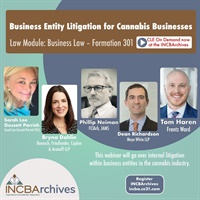
- Average Rating:
- 3
- Categories:
- Business | Business of Law | Corporate Governance | Litigation
- Faculty:
- SarahLee Gossett Parrish | Dean Richardson | Bryna Dahlin | Phillip Neiman | Tom Haren
- Duration:
- 1 Hour 6 Minutes
- Format:
- Audio and Video
- SKU:
- INCBA05262021OD
- License:
- Short Description:
- This webinar will go over internal litigation within business entities in the cannabis industry.
- Price:
- $30.00 - $75.00
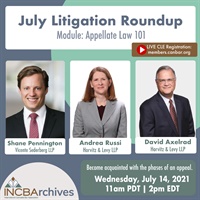
- Average Rating:
- Not yet rated
- Categories:
- Appellate Law | Administrative Law | Federal Law | Litigation | Regulation law | Webinar with CLE credit
- Faculty:
- Shane Pennington | David Axelrad | Andrea Russi
- Duration:
- 1 Hour 4 Minutes
- Format:
- Audio and Video
- SKU:
- INCBA07142021OD
- License:
- Short Description:
- This webinar provides an overview of the appellate process. Attendees will become acquainted with the phases of an appeal as well as key concepts like error preservation, the record, amicus practice, standards of review, and more.
- Price:
- $30.00 - $75.00
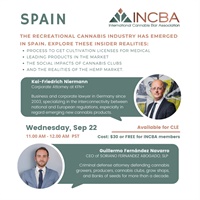
- Average Rating:
- 5
- Categories:
- Administrative Law | Litigation | Regulation law | Webinar with CLE credit
- Faculty:
- Kai-Friedrich Niermann | Guillermo Fernández Navarro
- Duration:
- 59 Minutes
- Format:
- Audio and Video
- SKU:
- INCBA092221ANOD
- License:
- Short Description:
- The recreational cannabis industry has emerged in Spain. We will explore the process to get cultivation licenses for medical cannabis producers, leading products in the market, the social impacts of cannabis clubs, and the realities of the hemp market.
- Price:
- $30.00 - $75.00

- Average Rating:
- 11
- Categories:
- Administrative Law | Litigation | Regulation law | Webinar with CLE credit
- Faculty:
- Scott Rudder | Mara Gordon | Tami Wahl
- Duration:
- 01:04:28
- Format:
- Audio and Video
- SKU:
- INCBA092921EMOD
- License:
- Short Description:
- Emerging Markets: New Pathways Under the FDA
- Price:
- $30.00 - $75.00

- Average Rating:
- 2
- Bundle:
- The Comprehensive Hemp Bundle
- Categories:
- Administrative Law | Hemp | Hemp Law
- Faculty:
- Shawn Hauser | Courtney Moran
- Duration:
- 1 Hour 1 Minutes
- Format:
- Audio and Video
- SKU:
- INCBA05122021HROD
- License:
- Short Description:
- As hemp policy continues to evolve, ensure you are staying at the forefront of regulatory developments to provide your clients with the best counsel for the 2021 production season.
- Price:
- $30.00 - $75.00

- Average Rating:
- 1
- Bundle:
- The Comprehensive Hemp Bundle
- Categories:
- Administrative Law | Cross Border Markets & Commerce | Federal Law | Hemp | Hemp Law
- Faculty:
- Jessica Wasserman, JD | Will Woodlee | Andrea Golan | Wendi Young
- Duration:
- 1 Hour 7 Minutes
- Format:
- Audio and Video
- SKU:
- INCBA05122021FDAOD
- License:
- Short Description:
- With a new Administration and Congress, changes in personnel at FDA and new safety data being published, is 2021 the year when CBD will come out from under the FDA shadows to be legally marketed in all 50state?
- Price:
- $30.00 - $75.00

- Average Rating:
- Not yet rated
- Bundle:
- The Comprehensive Hemp Bundle
- Categories:
- Environmental Law | Federal Law | Hemp | Hemp Law
- Faculty:
- Jessica Wasserman, JD | Mackenzie Schoonmaker | Michelle Bodian | Amy Wang
- Duration:
- 1 Hour 9 Minutes
- Format:
- Audio and Video
- SKU:
- INCBA061521HE3OD
- License:
- Short Description:
- Environmental compliance is an important legal area for hemp production.
- Price:
- $30.00 - $75.00

- Average Rating:
- 9
- Categories:
- Cannabis | Employment law | Policy | Racial Justice | Regulations | Social Equity
- Faculty:
- Jessica F. Gonzalez, Esq. | Joseph A. Bondy | Devaughn Ward | Ami Kachalia
- Duration:
- 59 Minutes
- Format:
- Audio and Video
- SKU:
- INCBA060921USOD
- License:
- Short Description:
- This CLE will provide policy recommendations on criminal justice reform in the cannabis industry for states to consider and adopt.
- Price:
- $30.00 - $75.00

- Average Rating:
- 2
- Categories:
- Administrative Law | Business | International Law | Webinar with CLE credit
- Faculty:
- Kai-Friedrich Niermann | Daniel Haymann, MBA | Peter Steger
- Duration:
- 1 Hour 4 Minutes
- Format:
- Audio and Video
- SKU:
- INCBA05262021OD
- License:
- Short Description:
- This one hour session will touch on the legal framework of recreational and medicinal cannabis in Switzerland and provide a high-level overview of the newest developments, the challenges, as well as the opportunities in Switzerland’s dynamic cannabis market.
- Price:
- $30.00 - $75.00

- Average Rating:
- 6
- Categories:
- Federal Law | Regulation law
- Faculty:
- Andrea Steel | Eliyahu Scheiman, J.D. | Rob DiPisa | Eric D Postow
- Duration:
- 1 Hour 2 Minutes
- Format:
- Audio and Video
- SKU:
- INCBA05122021OD
- License:
- Short Description:
- Those already in the cannabis industry and those looking to get into it will get a chance to learn more about newest adult-use markets in the country, how they compare to one another, and what we can anticipate as these new opportunities take shape.
- Price:
- $30.00 - $75.00

- Average Rating:
- 2
- Categories:
- Federal Law | Regulation law
- Faculty:
- Rita Montoya, J.D. | Chenae Bullock | Mary Jane Oatman
- Duration:
- 1 Hour 2 Minutes
- Format:
- Audio and Video
- SKU:
- INCBA101321SOCIALOD
- License:
- Short Description:
- Social Equity: Social Equity and Justice for the Indigenous Community. This CLE will focus on social equity and social justice issues within the indigenous community. Speakers will discuss tribal sovereignty, federal and state recognized tribes and barriers to entry for indigenous tribes into the cannabis industry.
- Price:
- $30.00 - $75.00

- Average Rating:
- 19
- Categories:
- Business | Cross Border Markets & Commerce | Regulation law
- Faculty:
- Brandon Wyatt | Phillip Neiman | Marc Hauser | Irina Dashevsky | Chirali Patel | Adam Smith
- Duration:
- 1 Hour 30 Minutes
- Format:
- Audio and Video
- SKU:
- INCBA05042021OD
- License:
- Short Description:
- In this 90-minute program, panelists will discuss a range of topics related to the interstate commerce ban, including licensee residency requirements adopted in many states (and associated litigation); the Dormant Commerce Clause; economic and social equity implications of closed markets; and the possibility of interstate compacts as a stopgap pending federal legalization. Speakers will also address the ban’s impact on medical patients and how pending legislation and post-legalization regulatory schemes may impact licensed operators and other industry participants.
- Price:
- $30.00 - $75.00

- Average Rating:
- 1
- Categories:
- Administrative Law | International Law | International Webinar
- Faculty:
- Jason Moscovici | Marie Sanchez
- Duration:
- 1 Hour 5 Minutes
- Format:
- Audio and Video
- SKU:
- INCBA04282021OD
- License:
- Short Description:
- The purpose of this webinar is to provide a clear overview of the current regulatory landscape in France on both medical cannabis and wellness hemp/CBD and to answer some frequently asked questions in order to provide some practical tips as to what can be done or not and what to expect in the near future.
- Price:
- $30.00 - $75.00
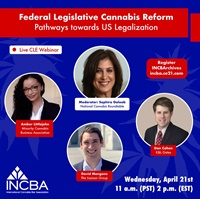
- Average Rating:
- 14
- Categories:
- Administrative Law | Cannabis | Cross Border Markets & Commerce | Licensing and Permitting | Medical/Healthcare/Access | Policy | Regulation law
- Faculty:
- Saphira Galoob | David Mangone | Dan Cohen | Margeaux Bruner
- Duration:
- 1 Hour 3 Minutes
- Format:
- Audio and Video
- SKU:
- INCBA04212021OD
- License:
- Short Description:
- This panel seeks to address the pathways for federal cannabis reform in the 117th Congress, considering legislative vehicles, political pragmatism, and actions of the Administration.
- Price:
- $30.00 - $75.00

Product Type

Product Type
- Faculty:
- Joslin E. Monahan | Shoran Williams | Timothy L. Alger | Shay Gilmore | John Agos | Lisa Gora | Kellie Rivera | Lauren Rudick | ....

Product Type

Product Type
- Faculty:
- Reggie Babin | Shanita Penny | David Culver | Bryan Barash | Rend Al-Mondhiry | Amber Littlejohn | Andrea Steel | Eric Steenstra | ....

Product Type
- Faculty:
- Fatima Afia | Whitney A. Hodges | Randal John Meyer | Joseph Segilia | Rafi Aliya Crockett | Caroline J. Lambert | Matt Lee | Adam Smith | ....

Product Type

Product Type
- Faculty:
- Meital Manzuri | Laura Schniedwind | Neil Kaufman | Cynthia Cabrera | JD McCormick | Philip Snow | Tami Wahl | Jessica C. McElfresh | ....

Product Type
- Faculty:
- Marie Sanchez | Robert Hoban | Lorenza Romanese | Robert Jappie | Pamela Nicole Epstein | Courtney Moran | Shawn Hauser | Rusty Rumley | ....

Product Type

Product Type
- Faculty:
- David Feldman | Catia Kossovsky, Esq. | Samantha Gleit | Neil Kaufman | Daniel Haymann | Jessica C. McElfresh | Joslin E. Monahan | Tom Firestone | ....

Product Type

Product Type
- Faculty:
- Jessica Wasserman | Heather Azzi | Mai T. Dinh | Christopher Arneson | Giacomo Bulleri | Lorenza Romanese | Sergio Martines | Cinzia Citti | ....
Please wait ...